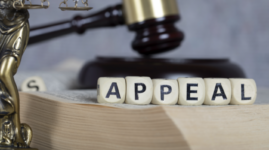Can I Get a Harsher Penalty if I Appeal a Decision in NSW?

If you’re disappointed by an outcome of a criminal case in court, or you’ve received a hefty penalty notice for a traffic or minor criminal offence, you may be tempted to appeal a decision or, in the case of a penalty notice, elect (choose) to have the matter heard in court.
But are you putting yourself at risk of an even worse outcome?
The following outlines the process of appealing to higher courts as well as electing to have traffic offences heard in court.
Appeals from Local Court to the District Court
Cases decided in the Local Court are usually appealed to the District Court of New South Wales, either against the conviction (a finding of guilt after a defended hearing) or the sentence (the penalty) received after a plead of guilty or finding of guilt.
Appeals to the District Court are known as hearings de novo – which means fresh hearings.
Appeals against conviction
For appeal against conviction, which are also known as ‘conviction appeals‘, the District Court judge will review the transcript of the original hearing and, provided an application to tender fresh evidence is allowed, consider any such fresh evidence.
Each party, the defence and prosecution, will be allowed to make written and/or verbal submissions to the court.
The judge will then decide whether the defendant is guilty or not guilty of the offence/s charged.
Appeals against sentence
For appeals against sentence, which are also known as ‘severity appeals’, the District Court judge will receive and review a tender bundle provided by the prosecution, which will include all of the materials handed up in the Local Court, which may include a letter of apology from the defendant, character references, certificates from courses, counselling reports and of course the original court attendance notice (which contains the allegations).
The parties will be given the opportunity to tender any further materials – including any written submissions – and to also make verbal submissions to the court, after which the judge will determine the appropriate penalty.
Parker directions
It is important to be aware that a District Court judge is not permitted to impose a harsher penalty than that which was handed-down in the Local Court until and unless the judge has warned the defendant this is being considered.
This requirement is known as a ‘Parker direction’ or ‘Parker warning‘, being derived from the ruling in the case of Parker v DPP (1992) 28 NSWLR 28.
If a Parker direction is given, a defendant can seek leave to withdraw the appeal at that stage and thereby remove the risk of a harsher penalty.
In practical terms, the requirement to give a Parker warning means a defendant will not receive a harsher penalty in the District Court, provided of course that they – or their criminal defence lawyer – knows what he or she is doing.
Appeals to the NSW Court of Criminal Appeal
Appeals against conviction in trials conducted in the District or Supreme Court can be made to the highest criminal court in our state, which is the New South Wales Court of Criminal Appeal (NSWCCA).
A range of materials will need to be filed in the NSWCCA before the appeal reaches a hearing, which is before a three-judge panel.
These materials will normally include a notice of intention to appeal, a notice of appeal (which needs to be filed within 6 months after the notice of intention), grounds of appeal (ie the basis or bases upon which the appeal is being made) and written submissions in support of the appeal
These appeals are not hearings de novo – rather, some form of error of law will need to be demonstrated in order for a defendant (who will at this time be known as the appellant) to succeed.
In terms of appeals against severity of sentence, judges sitting in the NSWCCA are not required to give a Parker direction – they have the discretion to impose a more lenient penalty, a harsher penalty or the same penalty that was handed down previously.
If the prosecution wishes to appeal a sentence on the basis it is too lenient, it will need to firmly demonstrate the penalty was not just a little too lenient, but ‘manifestly inadequate’; which can be a difficult hurdle for it to overcome.
Electing to go to court over a penalty notice or licence suspension
If you’ve received a penalty notice for a traffic offence such as speeding, running a red light camera or using a mobile phone while driving, you may wish to elect to have your matter heard in court – which is known as a ‘driver licence appeal‘ if you are looking at a licence suspension.
You can elect to take the matter to court on the basis that you are not guilty of the offence – in which case the matter will go to a ‘defended hearing’ during which the magistrate will decide whether you are guilty or not guilty – or admit the offence and seek leniency, such as a shorter suspension.
Going to court can have a number of advantages, particularly if you don’t believe that the penalty is fair or reasonable under the circumstances. A magistrate is more likely to be considerate of your needs and concerns.
It’s important to know that by electing to go to court, the maximum penalty can increase – normally to 20 penalty units; which is $2,200 at the time of writing.
Going to court?
If you are going to appeal a court decision, call Sydney Criminal Lawyers® anytime on (02) 9261 8881 to arrange a free first conference with an experienced appeal lawyers, who will take the time to advise you of your options, the best path forward and the costs involved.







